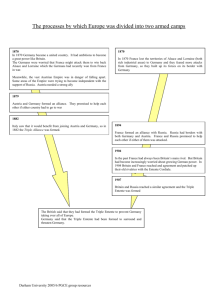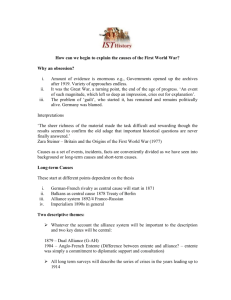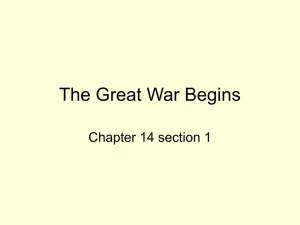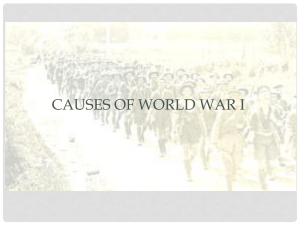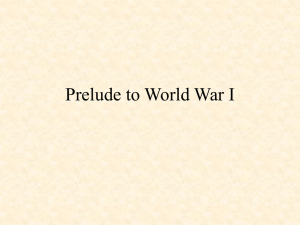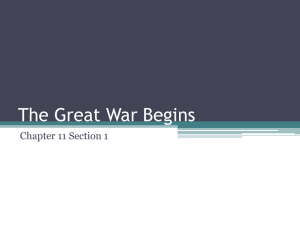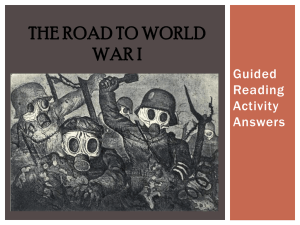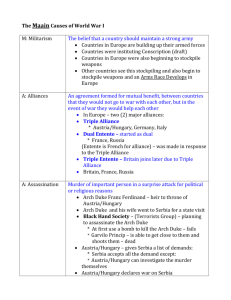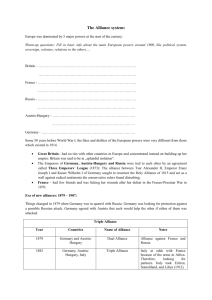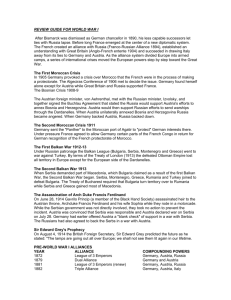WW1-Causes-Summary resource
advertisement
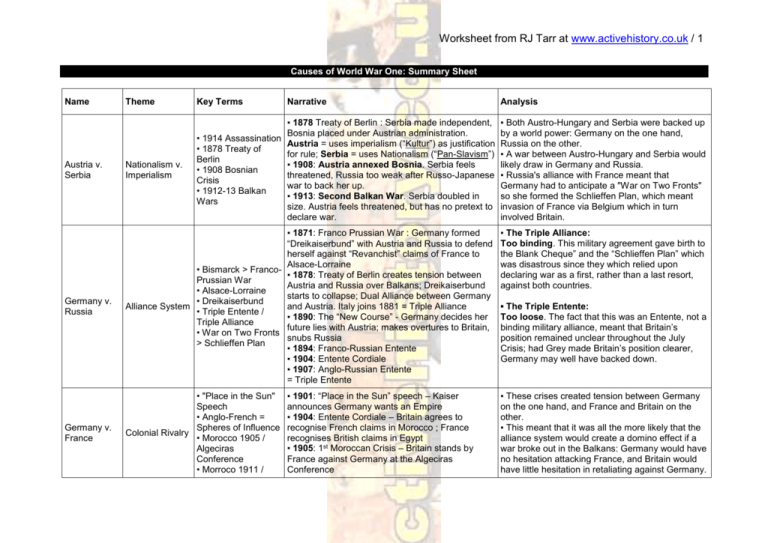
Worksheet from RJ Tarr at www.activehistory.co.uk / 1 Causes of World War One: Summary Sheet Name Theme Key Terms Narrative Austria v. Serbia Nationalism v. Imperialism ▪ 1878 Treaty of Berlin : Serbia made independent, Bosnia placed under Austrian administration. • 1914 Assassination Austria = uses imperialism (“Kultur”) as justification • 1878 Treaty of for rule; Serbia = uses Nationalism (“Pan-Slavism”) Berlin ▪ 1908: Austria annexed Bosnia. Serbia feels • 1908 Bosnian threatened, Russia too weak after Russo-Japanese Crisis war to back her up. • 1912-13 Balkan ▪ 1913: Second Balkan War. Serbia doubled in Wars size. Austria feels threatened, but has no pretext to declare war. ▪ Both Austro-Hungary and Serbia were backed up by a world power: Germany on the one hand, Russia on the other. ▪ A war between Austro-Hungary and Serbia would likely draw in Germany and Russia. ▪ Russia's alliance with France meant that Germany had to anticipate a "War on Two Fronts" so she formed the Schlieffen Plan, which meant invasion of France via Belgium which in turn involved Britain. ▪ The Triple Alliance: Too binding. This military agreement gave birth to the Blank Cheque” and the “Schlieffen Plan” which was disastrous since they which relied upon declaring war as a first, rather than a last resort, against both countries. Germany v. Russia ▪ 1871: Franco Prussian War : Germany formed “Dreikaiserbund” with Austria and Russia to defend herself against “Revanchist” claims of France to Alsace-Lorraine • Bismarck > Franco▪ 1878: Treaty of Berlin creates tension between Prussian War Austria and Russia over Balkans; Dreikaiserbund • Alsace-Lorraine starts to collapse; Dual Alliance between Germany • Dreikaiserbund Alliance System and Austria. Italy joins 1881 = Triple Alliance • Triple Entente / ▪ 1890: The “New Course” - Germany decides her Triple Alliance future lies with Austria; makes overtures to Britain, • War on Two Fronts snubs Russia > Schlieffen Plan ▪ 1894: Franco-Russian Entente ▪ 1904: Entente Cordiale ▪ 1907: Anglo-Russian Entente = Triple Entente Germany v. France • "Place in the Sun" Speech • Anglo-French = Spheres of Influence Colonial Rivalry • Morocco 1905 / Algeciras Conference • Morroco 1911 / ▪ 1901: “Place in the Sun” speech – Kaiser announces Germany wants an Empire ▪ 1904: Entente Cordiale – Britain agrees to recognise French claims in Morocco ; France recognises British claims in Egypt ▪ 1905: 1st Moroccan Crisis – Britain stands by France against Germany at the Algeciras Conference Analysis ▪ The Triple Entente: Too loose. The fact that this was an Entente, not a binding military alliance, meant that Britain’s position remained unclear throughout the July Crisis; had Grey made Britain’s position clearer, Germany may well have backed down. ▪ These crises created tension between Germany on the one hand, and France and Britain on the other. ▪ This meant that it was all the more likely that the alliance system would create a domino effect if a war broke out in the Balkans: Germany would have no hesitation attacking France, and Britain would have little hesitation in retaliating against Germany. Worksheet from RJ Tarr at www.activehistory.co.uk / 2 Germany v. Britain General Arms race July Crisis Mansion House Speech ▪ 1911: 2nd Moroccan Crisis – Britain stands by France against Germany in the Mansion House Speech • Kruger Telegram • Berlin-Baghdad Railway • Dreadnought • Peers v. People • Daily Telegraph Interview • Admiral Tirpitz ▪ 1896 : Kruger Telegram : Kaiser congratulates Boers on defeating the British ▪ 1898, 1900: German Naval Laws via Admiral Tirpitz ▪ 1906: Dreadnought makes other battleships obsolete ▪ 1908: Daily Telegraph Interview – Wilhelm calls the British “Mad as March Hares” ▪ 1911: Constitutional Crisis: A special “People’s Budget” to fund the naval race creates massive tensions between the Houses of Commons/Lords. ▪ The naval race created massive Anglo-German tension. ▪ It was both a cause and a consequence of British refusal to support Germany during the Morroccan Crises (=symbiotic relationship). ▪ It drove Britain into the arms of France and hardened the alliance system. • Colonel Apis • Blank Cheque • Ultimatum • Willy-Nicky Telegrams • Schlieffen Plan > AJP Taylor ▪ 28/06/1914: Assassination of Franz Ferdinand (=Austria) by Black Hand Gang member Princip (=Serbia). ▪ Serbia rejected the Austrian ultimatum; Austria declares war after Germany gives Austria a “Blank Cheque”. ▪ Willy-Nicky telegrams: Kaiser and Tsar try to avert the crisis but dialogue breaks down when Russia mobilises and Germany has to activate the Schlieffen Plan. ▪ The “Blank Cheque”, Russia’s early mobilisation and the “Schlieffen Plan” closed off diplomatic routes incredibly clearly.
